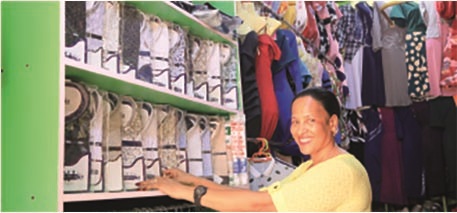
(L-R) Rishi Vadodaria and his wife Dr. Meera Vadodaria, Managing Directors of Rene Industries Limited handing over a certificate of appreciation to one of the members of staff Martin Okello, Production Supervisor. This was during the 25 years of existence celebrations held at Rene Industries Limited in Kireka Kampala on Saturday 24 2024. PHOTO BY COLLEB MUGUME
Rene Industries Directors
HABARI DAILY I Kampala, Uganda I At its 25 anniversary celebrations, the big corporate secret was revealed. Burundi is the next stop for Uganda’s gigantic pharmaceutical manufacturer.
Rishi Vadodaria, the Rene Industries managing director, said they are set to open a plant in Burundi, as part of their expansion campaign in the East African region.
“Many countries in this region are net importers of human medicine. We have decided that the only way we can enhance our production is through establishing a regional market,” he said during their 25th year anniversary celebrations, which they held at their office in Kireka recently.
He said they are currently exporting 20% of their products, adding their new plant in Burundi is over 50% complete, and will be ready by the end of next year.
“This plant will produce essential drugs to be sold in the central African region, where we are seeing a lot of potential,” said Vadodaria.
Vadodaria said they are currently exporting to Rwanda, Burundi, DRC Congo, South Sudan, Zambia and Malawi, and are automating their processes with an aim of enhancing production.
LOCAL PRESENCE
Having been established in 1985 under names of Rene Pharmacy they were prompted to go into human drug production after realizing the big void in availability of essential drugs on the local market.
“There was a lot of importation of medicines coming from India and China. Even when we ordered for stock, we would wait for months before receiving the consignment,” said Vadodaria, adding that in 1999, they embarked on production. “We kicked off by employing of 30 workers, and have grown to the current 700 workers todate. More than 100 of these are graduates of Pharmacy, Chemistry, Pharmaceutical Chemistry and Engineering.”
Rene Industries currently produces 3 billion tablets, 1 billion capsules, 10 million syrups and suspension bottles, 1 million dry syrups bottles and 3 million oral rehydration salts sachets, according to directors.
Vadodaria said a few years down the road, they decided to bring in the technology to make human medicines like tablet capsules and syrups.
“Our other products included Beta-lactam and non-beta-lactam products. We brought in a few specialists who embarked on training our Ugandan workers on how to produce globally accepted medicine brands. They taught them new technologies, and also turned to training graduates from Makerere University,” he said, adding that they knew these would be turned into reliable workers after a few years.

He said they exposed them to latest technology in the manufacturing of medicines, and for many years they were only producing 10 products.
“Most of these were painkillers, antibiotics, anti- diarrhea drugs. We also produced antibacterial medicines and antifungal medicines. Over a period of 25 years now we have grown. We are manufacturing more than 100 products of different dosage forms,” said Vadodaria.
SH74B INVESTMENT
Todate, the company directors have invested to the tune of sh74b, which has gone into erection of production lines, importation of storage facilities, transportation vehicles, training of manpower, construction of production facilities and warehouses.
“We have decided to invest further by opening new facilities for manufacturing other types of products like cephalosporins and injectables.
Vadodaria said they have procured a further 14 acres in Kireka for expansion, adding that they have made a decision to continue expanding on mostly the essential medicines which is very much required.
“We are also planning to hire more people and double our production capacity. We will also expand our product range, invest in state-of-the-art technology and build strong partnerships with healthcare providers, governments, NGOs in Uganda and in East Africa.”
COVID-19 LESSONS
During the lockdowns that were prompted by the COVID-19 pandemic, Rene Industries managed to expand exponentially through production of essential drugs.
“During that time, essential drugs were not being imported into Uganda because production power houses such as India and China were treating their own patients. There was a general scarcity for essential drugs, which prompted us to expand our product range,” said Vododaria.
“We scaled up to produce vitamin C, zinc tablets, sanitizers and many more life-saving drugs. This taught us to be self-sustaining and be ready during pandemics. We don’t need to depend on imported medicines,” he said, adding that currently, they produce up to 120 different types of products.
He said they want to ensure that in the next five years, Uganda attains 50% self-sustenance when it comes to human drugs. “Government spends millions of dollars every month to import essential drugs. In this era, we do not have to depend on imported drugs.




